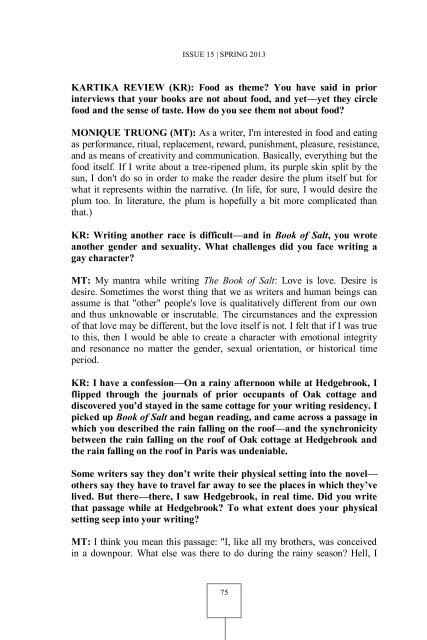Create successful ePaper yourself
Turn your PDF publications into a flip-book with our unique Google optimized e-Paper software.
ISSUE 15 | SPRING 2013<br />
KARTIKA REVIEW (KR): Food as theme? You have said in prior<br />
interviews that your books are not about food, and yet—yet they circle<br />
food and the sense of taste. How do you see them not about food?<br />
MONIQUE TRUONG (MT): As a writer, I'm interested in food and eating<br />
as performance, ritual, replacement, reward, punishment, pleasure, resistance,<br />
and as means of creativity and communication. Basically, everything but the<br />
food itself. If I write about a tree-ripened plum, its purple skin split by the<br />
sun, I don't do so in order to make the reader desire the plum itself but for<br />
what it represents within the narrative. (In life, for sure, I would desire the<br />
plum too. In literature, the plum is hopefully a bit more complicated than<br />
that.)<br />
KR: Writing another race is difficult—and in Book of Salt, you wrote<br />
another gender and sexuality. What challenges did you face writing a<br />
gay character?<br />
MT: My mantra while writing The Book of Salt: Love is love. Desire is<br />
desire. Sometimes the worst thing that we as writers and human beings can<br />
assume is that "other" people's love is qualitatively different from our own<br />
and thus unknowable or inscrutable. The circumstances and the expression<br />
of that love may be different, but the love itself is not. I felt that if I was true<br />
to this, then I would be able to create a character with emotional integrity<br />
and resonance no matter the gender, sexual orientation, or historical time<br />
period.<br />
KR: I have a confession—On a rainy afternoon while at Hedgebrook, I<br />
flipped through the journals of prior occupants of Oak cottage and<br />
discovered you’d stayed in the same cottage for your writing residency. I<br />
picked up Book of Salt and began reading, and came across a passage in<br />
which you described the rain falling on the roof—and the synchronicity<br />
between the rain falling on the roof of Oak cottage at Hedgebrook and<br />
the rain falling on the roof in Paris was undeniable.<br />
Some writers say they don’t write their physical setting into the novel—<br />
others say they have to travel far away to see the places in which they’ve<br />
lived. But there—there, I saw Hedgebrook, in real time. Did you write<br />
that passage while at Hedgebrook? To what extent does your physical<br />
setting seep into your writing?<br />
MT: I think you mean this passage: "I, like all my brothers, was conceived<br />
in a downpour. What else was there to do during the rainy season? Hell, I<br />
75


